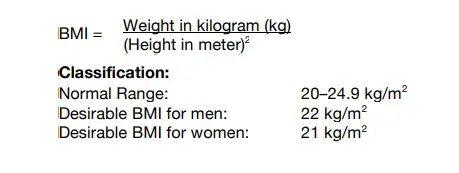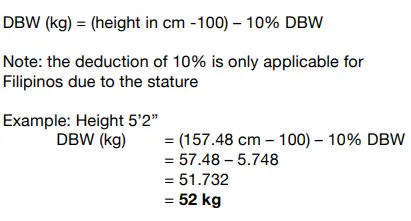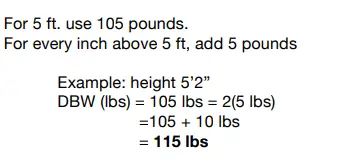How To Maintain an Ideal Body Weight

Suppose you are eating balanced meals and doing regular exercises. In that case, you are probably confident that your current weight is ideal based on your height, resulting in a normal Body Mass Index (BMI).
But how can you keep your BMI normal if many factors affect your weight like genetics, diet, physical activities, sleep, stress, and hormonal imbalances? In this article, you will learn how to compute your Ideal Body Weight (IBW) and maintain it according to science.
Table of Contents
- What Is Ideal Body Weight (IBW)?
- How To Compute Your Ideal Body Weight
- How To Maintain Your Ideal Body Weight (IBW): 5 Tips
- Frequently Asked Questions
- References
What Is Ideal Body Weight (IBW)?
Ideal body weight (IBW) is a clinical standard that takes into account biological factors such as height, sex, and age. It is also used to assess the correct amount of prescribed medications for patients and to measure body weight in athletes using a classification scale in sports.
The World Health Organization (WHO) acknowledges BMI measures as a reliable means of determining an individual’s IBW status, particularly when pathological circumstances pose health risks. Doctors use IBW to aid in identifying whether an individual is at risk of cardiovascular disease, diabetes, or obesity. However, it is not a universal criterion for evaluating body fat and muscle composition since it differs between individuals.
How To Compute Your Ideal Body Weight
The first thing to do to achieve your ideal body weight is to compute how much you should weigh if you are a normal Filipino adult. Below are the three simple computations you can use.
1. Body Mass Index (BMI)-Based Formulation

2. Tannhauser’s Method

3. Adopted Method

How To Maintain Your Ideal Body Weight (IBW): 5 Tips
Maintaining a healthy weight is an important part of aging healthy. Elevated body mass index (BMI) in older people, as in earlier stages of life, may increase the likelihood of developing health problems. Examples include heart disease, high blood pressure, stroke, and diabetes. These risks can be avoided by reducing or maintaining your ideal body weight.
Being underweight likewise increases your chances of developing health problems. You are more likely to develop medical problems such as osteoporosis and anemia if you have a low BMI, and recovering from a sickness or infection may be more difficult.
The following are some ways to maintain your IBW, according to science:
1. Plan Your Meals to Keep Track of Your Daily Calories Consumption

Meal planning1 can be a valuable strategy for overcoming time constraints and encouraging home meal preparation, resulting in improved diet quality, which, in turn, helps you achieve your ideal body weight.
When planning for meals, it should be according to your requirements; thus, the following should be considered:
- Weight goal (how much weight you should lose or gain)
- Physical activity levels
- Dietary requirements, if you have existing medical conditions
- Familiarity with cooking methods
- Time allotment for preparing your meals
- Budget
Meal plans containing 1,200–1,500 calories daily can help most women lose weight safely. Meanwhile, meal plans containing 1,500–1,800 calories per day are most appropriate for men and women who weigh more or exercise frequently.
2. Drink Enough Water Daily

The amount of water consumed daily through meals, plain drinking water, and other beverages is referred to as total fluid intake. Recommendations for daily fluid intake vary by age, gender, pregnant status, and breastfeeding status.
Besides helping you maintain your healthy weight, consuming your recommended fluid intake prevents constipation, aids digestion, normalizes blood pressure, and regulates body temperature. On the other hand, you are at risk of dehydration if you do not drink enough water each day. Signs of being dehydrated are weakness and low blood pressure.
So how much water should you drink in a day? The answer is that it varies to individuals as taking too much water is possible if you have certain conditions and take medications that make you retain water in your body. It is recommended to speak with your doctor or dietitian to know the right amount for you. But as a general rule of thumb for healthy persons, eight glasses of water a day should not harm.
Water and other beverages meet the majority of your fluid requirements. It can be obtained from foods, particularly those high in water content, such as many fruits and vegetables. Drinking water is a good strategy to get fluids while maintaining your ideal body weight as it has zero calories2.
3. Manage Your Stress

Researchers have long known that increases in the stress hormone cortisol can contribute to weight gain. When stressed, your adrenal glands release adrenaline and cortisol, which cause glucose (your primary energy source) to be released into your circulation. This process provides the energy required to flee a dangerous situation (also known as the fight or flight response).
When the threat has passed, your adrenaline high wears off, and your blood sugar spikes. This is when cortisol kicks in to refill your energy supply. After the quick rise of cortisol, you usually engage in unhealthy habits such as emotional eating, consuming fast food, skipping meals, smoking, and sleeping less, all of which can cause weight gain3.
4. Keep a Healthy Sleep Schedule

According to a recent study published in the American Journal of Health Promotion4, those with a consistent sleep schedule tend to have a lower body fat than those with irregular sleep hours.
Researchers discovered that receiving less than 6.5 hours of sleep or more than 8.5 hours is associated with increased body fat. In other words, high-quality sleep is linked to decreased body fat, while poor sleep is linked to increased body fat. Furthermore, waking and sleeping at the same time every day (especially a constant waking time) is highly associated with decreased body fat.
While researchers are not sure how sleep schedules impact body mass and fat, other studies have found that sleep affects physical activity, hunger, and the hormones that regulate appetite, metabolism, and the signs that tell us we’re full. Sleep deprivation increases the production of ghrelin, the hormone that controls food appetites, and decreases the production of leptin, the hormone that signals satiety and helps prevent overeating.
5. Do Regular Physical Activities

Regular physical exercise is essential for good health, especially if you are trying to lose or maintain your ideal body weight. It uses the excess calories you consume from too much food intake in a day and is supposed to be stored as fat, if not burned.
When losing weight, increasing your physical activity increases the number of calories your body burns. This, together with limiting the number of calories you eat, provides a “calorie deficit” that results in weight loss.
A good calorie deficit strategy to achieve and eventually maintain your ideal weight is consuming less than 500 calories from your recommended calories daily. For example, if your body requires 2,000 calories to function well, you should only be taking 1,500 calories each day to lose 1-2 lbs in a week.
Research reveals that the best way to keep your body weight is to participate in regular physical exercises5. It can help you maintain weight over time and decrease your risk of developing cardiovascular disease and diabetes. However, the exact amount of physical activity required to do this is still unclear because it varies widely from person to person.
To maintain your weight, you may need to exercise more than 150 minutes of moderate-intensity activity every week.
Frequently Asked Questions
1. My family has a history of having a big body type. Does genetics influence my current weight?
Genetics plays a role in determining your weight. If you have most or all of the following characteristics, genes are likely to contribute to your obesity6:
- You have been overweight for a long time.
- One or both of your parents and several other direct relatives are overweight. If both of your parents are obese, your chances of being obese are as high as 80%.
- You cannot lose weight even if you increase your physical activity and follow a low-calorie diet for several months.
But that is not the end of the story. The environment, lifestyle, and healthy choices all affect how much you weigh.
2. Some say keeping an eye on your body composition is more important than monitoring changes in your body weight. Is it true?
Body composition is a more accurate way to evaluate progress regarding general health. According to one study, even if total weight remains the same, it’s still positive if fat percentage decreases and muscle or fat-free mass increases7.
References
- Ducrot, P., Méjean, C., Aroumougame, V., Ibanez, G., Allès, B., & Kesse-Guyot, E. et al. (2017). Meal planning is associated with food variety, diet quality and body weight status in a large sample of French adults. International Journal Of Behavioral Nutrition And Physical Activity, 14(1). doi: 10.1186/s12966-017-0461-7
- Muckelbauer, R., Sarganas, G., Grüneis, A., & Müller-Nordhorn, J. (2013). Association between water consumption and body weight outcomes: a systematic review. The American Journal Of Clinical Nutrition, 98(2), 282-299. doi: 10.3945/ajcn.112.055061
- Xenaki, N., Bacopoulou, F., Kokkinos, A., Nicolaides, N., Chrousos, G., & Darviri, C. (2018). Impact of a stress management program on weight loss, mental health and lifestyle in adults with obesity: a randomized controlled trial. National Library Of Medicine, 7(2), 78-84. Retrieved from https://www.ncbi.nlm.nih.gov/pmc/articles/PMC6296480/
- Bailey, B., Allen, M., LeCheminant, J., Tucker, L., Errico, W., Christensen, W., & Hill, M. (2014). Objectively Measured Sleep Patterns in Young Adult Women and the Relationship to Adiposity. American Journal Of Health Promotion, 29(1), 46-54. doi: 10.4278/ajhp.121012-quan-500
- Cox, C. (2017). Role of Physical Activity for Weight Loss and Weight Maintenance. Diabetes Spectrum, 30(3), 157-160. doi: 10.2337/ds17-0013
- Loos, R., & Yeo, G. (2021). The genetics of obesity: from discovery to biology. Nature Reviews Genetics, 23(2), 120-133. doi: 10.1038/s41576-021-00414-z
- Willoughby, D., Hewlings, S., & Kalman, D. (2018). Body Composition Changes in Weight Loss: Strategies and Supplementation for Maintaining Lean Body Mass, a Brief Review. Nutrients, 10(12), 1876. doi: 10.3390/nu10121876
Written by Bermonica Satuito, RND
Bermonica Satuito, RND
Bermonica Satuito is a Registered Nutritionist-Dietitian (RND) who earned her degree from the University of the Philippines (UP) Los Baños. She is currently practicing in the medical aesthetics industry after working in research at WHO (World Health Organization) Philippines. Qualified and trained in educating individuals to achieve optimum well-being, she writes and creates content about health on various platforms. Youth leadership, community volunteering, SDGs, ASEAN, and entrepreneurship are among her interests.
Copyright Notice
All materials contained on this site are protected by the Republic of the Philippines copyright law and may not be reproduced, distributed, transmitted, displayed, published, or broadcast without the prior written permission of filipiknow.net or in the case of third party materials, the owner of that content. You may not alter or remove any trademark, copyright, or other notice from copies of the content. Be warned that we have already reported and helped terminate several websites and YouTube channels for blatantly stealing our content. If you wish to use filipiknow.net content for commercial purposes, such as for content syndication, etc., please contact us at legal(at)filipiknow(dot)net
